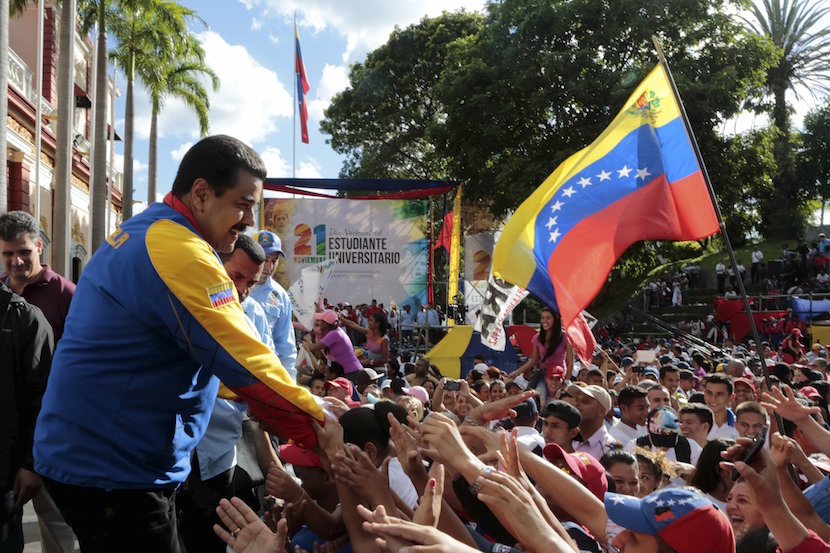Socialists are dogged by short and selective memories. By any conceivable measure, Leninism-Marxism has brought nothing but economic hardship and misery wherever enforced. Yet socialists continue to hammer away at their command and control theories – grabbing at an ever reducing number of straws to argue the point. They’re about to lose one more of these with pending rejection by the citizenry of Venezuela, once the poster state of global socialist dreams. The oil price collapse exposed the late Hugo Chavez’s empire for the autocratic, mismanaged disaster which exiles like Moises Naim have long said it was. Virtually nine out of ten Venezuelans say the country is doing “badly or horribly”. In next month’s election they are set to eject those who led them there, voting from office successors of the late Chavez’s experiment with “21st Century Socialism”. AN experiment, it is now obvious, which ended up just as disastrously as every other one tried by socialists around the world. Dare we hope it’s a wake-up call for the similarly deluded loudmouths occupying the southern tip of Africa? – Alec Hogg
By Mac Margolis
(Bloomberg View) – By almost any objective measure, Venezuelan President Nicolas Maduro is heading for a fall. The country’s economy is a shambles; even Bolivia, long South America’s poorest nation, is outperforming Venezuela. Some 89 percent of Venezuelans say the country is faring badly or horribly. And with the Dec. 6 legislative elections approaching, candidates for the ruling United Socialist Party are trailing by 25 to 30 percentage points, according to a batch of opinion polls.

What that means for Venezuela as a whole is less clear. The country’s opposition is a 27-party pastiche, riven by feuding and one-upmanship. That’s one reason 30 percent of voters say they like neither the ruling party nor the Democratic Unity Roundtable, the main opposition bloc. But while there’s little love lost for Maduro, 58 percent of Venezuelans still have a soft spot for his predecessor, Hugo Chavez, the charismatic founder of the Bolivarian revolution whose death from cancer in 2013 threw the country into despair.
Quick Take Venezuela
This paradox poses some special challenges for Venezuela’s aspiring democrats. First, they must win a contest in which the rules are stacked against them: In 2010, opposition candidates captured more than half the popular vote but — thanks to gerrymandering, rules-rigging and overrepresentation of pro- government rural regions– ended up with around 40 percent of the seats in the National Assembly.
Read also: This is SA’s Future? Bloomberg View: How socialist Chavez trashed Venezuela
This time may be different, however. Yes, Maduro has vetoed independent election observers and vowed he’ll never surrender the revolution to apostates. But from a government bleeding popularity and poisoned by intrigue and rivalries, that sounds more like Bolivarian blunderbuss than a credible threat.
Latin America is no longer a club of autocrats, as Venezuelan economist and blogger Juan Cristobal Nagel has aptly noted. Think Chile circa 1988, when a plebiscite sent longtime dictator Augusto Pinochet packing, or Peru in 2000, when Alberto Fujimori was hounded out of office after attempting to steal an election.
Despite the lopsided playing field, challengers to Venezuela’s 16-year experiment in “21st-century socialism” have never been so close to gaining real power. Political analysts say their magic number is 18 percent — the margin they need in order to win two-thirds of the seats in the National Assembly and have enough to change Venezuela’s constitution, Francisco Rodriguez, chief Andean economist for Bank of America Merrill Lynch, said last week in New York.
Read also: IMF: Venezuela GDP -10% this year, -6% in 2016. Thought SA had problems?
But even a 12-percent margin, he said, would hand Maduro’s foes three-fifths of the 167-member chamber, enough to grant — or deny– the president the power to rule by decree in an emergency.
And even a simple majority of 84 seats would give opposition lawmakers plenty of clout to push for a recall referendum next year, which could mark the beginning of the end of Maduro’s hapless regime and, possibly, of Chavismo as well.
So how will they react if voters give them the nod? Granted, the National Assembly has not really been in charge since the days of Chavez. Lawmakers can veto the national budget, but Venezuela’s central bank still answers to the president, opposition leader Diego Arria told me.
A revived legislature could still be a force for restoring democracy. For one, lawmakers could raise a stink about the plight of political prisoners, including opposition firebrand Leopoldo Lopez, who was sentenced to more than 13 years in jail in what was widely regarded as little more than a show trial.
Read also: Brain drain in Venezuela: Lessons for SA?
Rescuing the economy will be harder. Venezuela’s gross domestic product is set to shrink 10 percent this year, and inflation will hit 159 percent. That’s a toxic legacy for anyone to inherit, and consumers who have faced epic queues to buy eggs and medicine may not be placated by the presence of new management in the congress.
“All candidates know the country needs to introduce austerity measures to right the economy. But no one wants to be blamed for implementing them,” said Javier Corrales, a Latin America scholar at Amherst College. “They’re not thinking beyond December 6.”
The good news is that for the first time in a generation, what Venezuela’s opposition leaders have to say actually matters. Now they must think not just about how to take back a country in ruins, but also how to govern it.

